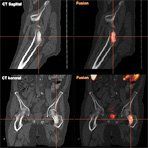ASCO 2011: Phase II Cabozantinib Trial in Patients with Advanced Solid Tumors and Bone Metastases
Data from a phase II study of cabozantinib (XL184) in patients with advanced solid tumors show that the drug has activity in both bone and soft tissue. The study evaluated the efficacy and safety of cabozantinib compared to placebo in 9 different solid tumor types including breast, lung, ovarian, and prostate.
Data from a phase II study of cabozantinib (XL184) in patients with advanced solid tumors show that the drug has activity in both bone and soft tissue. The study evaluated the efficacy and safety of cabozantinib compared to placebo in 9 different solid tumor types including breast, lung, ovarian, and prostate.

Osteoplastic Metastasis of Prostate Cancer in Choline PET/CT
The data from the abstract, “Activity of cabozantinib (XL184) in soft tissue and bone: Results of a phase II randomized discontinuation trial (RDT) in patients (pts) with advanced solid tumors” (J Clin Oncol 29: 2011 [suppl; abstr 3010]) will be presented at this year's annual meeting of the American Society of Clinical Oncology (ASCO) during the oral session "Developmental Therapeutics-Experimental Therapeutics" on Sunday June 5, 2011.
Cabozantinib is an oral, inhibitor of the tyrosine kinases, Met and vascular endothelial growth factor receptor 2 (VEGFR2). All patients in the study had progressive disease including bone metastases. The most common side effects were fatigue, hand-foot syndrome, and hypertension. Of 68 brain metastases patients, 59 showed a partial or complete response. Notable, the response was accompanied by symptom improvement.
XL184 has also been highlighted as an interesting entity to watch for ovarian cancer and prostate cancers with bone disease. In this study, 24% of ovarian cancer patients responded to treatment compared to 5–14% of patients with other tumor types.
In prostate cancer patients, an “unprecedented bone scan improvement” was observed. Based upon these results, Exelixis, the company that is developing cabozantinib will expand the prostate and ovarian cancer cohorts for this trial and also plans to initiate the first pivotal trial in prostate cancer by the end of this year.